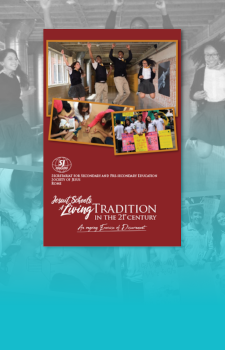Foreword, the conversation must continue…
The International Commission on the Apostolate on Jesuit Education (ICAJE) has worked since 2011 on the document you have now. From the beginning, the conversation was about how we can help schools’ communities to understand and respond to our present context and continue the long conversation that the first Jesuits began on education in the sixteen century. This long conversation produced important documents that guided Jesuit education through the centuries. The Ratio Studiorum of 1599 was the first of these documents. The Ratio portrays the educational model that guided our schools and created a sense of unity around a common curriculum and a common school structure. Its success and limitations have been amply discussed throughout the centuries. It took the Jesuits and their apostolic companions several centuries before we agreed on a new document to respond to the new contexts: The Characteristics of Jesuit Education of 1986 puts together the consensus of what is central and characteristic of our education at the end of the twentieth century. This document allowed schools to build a new unity around a common identity that develops into many different models and responds to the local and national contexts of our schools. The reception of this document was very enthusiastic and educators in Jesuit schools began to ask for another one to clarify the pedagogical style that could embody the twenty-eight characteristics. The result was another document, Ignatian Pedagogy: A Practical Approach in 1993. This document has become a pedagogical staple for many generations of Jesuit educators who devotedly work in all corners of the world to continue the living tradition of Jesuit Education and make it true especially in the crucial place where Jesuit education really happens: the classroom.
However, Jesuit Education, as human history itself, is a living tradition that calls for open eyes, ears and hearts. This document wants to be an invitation to continue this conversation at all levels in our schools and school networks. We are, at ICAJE, even hesitant to call it a document since we want this to be a living text that can help us keep the pace with our era in which fast change is the new normal, with all the positive and problematic aspects this entails. We do not want a static document but rather a text that inspires, moves and encourages our faculties, leaders and school communities to engage proactively our context, our world, our challenges and our opportunities. This is why this text will be mainly published electronically since it requires an ongoing exercise of discernment that creatively, boldly and generously invites us to walk the talk in our schools and to continue our tradition with renewed vigor and zeal. To facilitate this process all sections of the document offer questions for discernment that should encourage listening, discussion, conversations and creativity.
ICAJE also wants to express our gratitude to the many contributors that make the document possible. This conversation began in 2011 and has seen many important actors: the different members of ICAJE throughout these years, the many generous companions from the 6 regions of the Society that provided an initial feedback, the specialists that offered their advice and expertise to later drafts, and the support group of the Secretariat for Education of the General Curia that accompany the whole process. Our special gratitude to Fr. John O’Keefe SJ and his team and to Mr. William Kemeza because of their significant contributions to the document in its present format and style. Their contributions have made all the difference!
The only reason the Society of Jesus commits to continuing our educational apostolate is the unflinching conviction that today, like yesterday, schools are privileged spaces to fulfil our mission of reconciliation and justice within the framework of the four Universal Apostolic Preferences for 2019-2029 announced by Fr. General:
- To show the way to God through the Spiritual Exercises and discernment
- To walk with the poor, the outcasts of the world, those whose dignity has been violated, in a mission of reconciliation and justice
- To accompany the young in the creation of a hope-filled future
- To collaborate in the care of our Common Home
May God continue blessing the important apostolic effort that our schools do to invite the new generations to open their lives to God and embrace the education of the whole person within our humanist tradition. Let us continue the fascinating journey of Jesuit Education today and participate in the conversation that allows Jesuit Education to be always a learning and living tradition.
José A. Mesa SJ
Worldwide Secretary for Education
Society of Jesus


